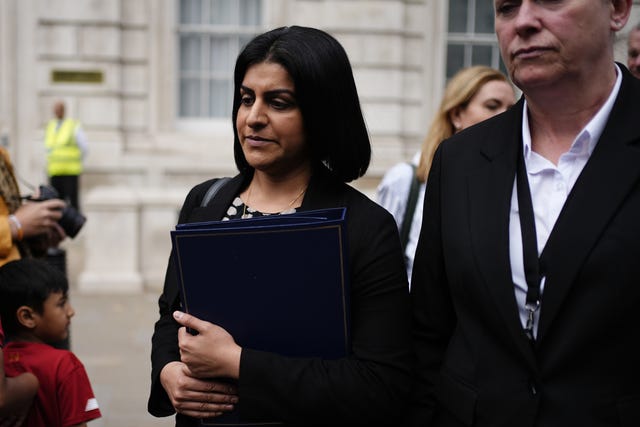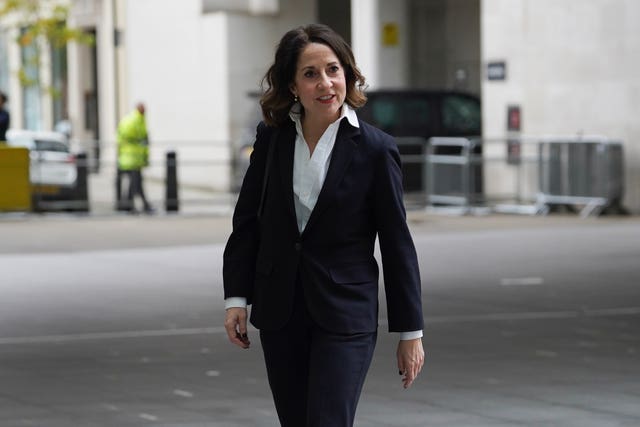
MPs will take part in a vote this week on whether to legalise assisted dying for terminally ill people after a row over ministerial criticism of the Bill deepened on Sunday.
Labour backbencher Kim Leadbeater’s legislation will come before the Commons on Friday, with the first debate and vote of its kind in the House since 2015.
Members will be given a free vote on the issue, allowing them to make a decision according to their own conscience rather than in line with party policy.
It comes after Justice Secretary Shabana Mahmood criticised the legislation and made clear she would vote against it in a strongly worded letter to constituents which emerged over the weekend.

Ms Mahmood said the Bill could open the door to a “slippery slope to death on demand”, while Health Secretary Wes Streeting has also faced a backlash for suggesting it could cost the NHS more.
In a letter last month, Cabinet Secretary Simon Case said the Government would remain neutral and suggested ministers avoid taking part in public debate on the issue.
Prime Minister Sir Keir Starmer has declined to say which way he will vote, arguing that he does not want to put pressure on other MPs.
The Cabinet is split over the issue, with more members believed to be in favour than against.
Culture Secretary Lisa Nandy, Work and Pensions Secretary Liz Kendall, Northern Ireland Secretary Hilary Benn, Transport Secretary Louise Haigh and Energy Secretary Ed Miliband have all said they will back the law.
Others including Home Secretary Yvette Cooper have been less explicit but indicated their support for the measures in the Bill.
Meanwhile Ms Mahmood, Mr Streeting and Education Secretary Bridget Phillipson and Business Secretary Jonathan Reynolds have said they will reject the legislation.

Ms Kendall defended her Cabinet colleagues voicing “strong opinions” about the Bill as she spoke to broadcasters on Sunday morning.
But Labour peer Lord Falconer, a former justice secretary and longstanding proponent of a change in the law, criticised the Justice Secretary’s intervention on Sunday.
He told the Guardian that ministers speaking out against the Bill were “breaking the rules spectacularly” and giving the “false impression” that their departments were also opposed to it.
“The rule-breakers are getting more coverage because they’re breaking the rules so spectacularly,” he said.
Supporters of the Bill are optimistic that it has enough backing for the legislation to pass the first Commons hurdle, but the result will not be known until a division list is published after the vote showing which way MPs voted.

Proponents argue existing legislation fails to respect patient autonomy and discriminates financially between those who can afford to travel abroad to end their lives within the law and those who cannot.
Many of those opposed to a law change have voiced concern about the potential for coercion and mission creep, and say the legislation has been rushed.
A group of group of 29 faith leaders united to oppose the Bill in joint letter on Sunday, saying they were “deeply concerned” that it could open up the possibility of “life-threatening abuse”.
Ms Leadbeater has described Terminally Ill Adults (End of Life) Bill as the most “robust” in the world, with “three layers of scrutiny” in the form of a sign-off by two doctors and a High Court judge.
It would also make coercion an offence with a possible punishment of 14 years in jail.
The Bill, which covers England and Wales, states that only terminally-ill adults with under six months left to live and a settled wish to die would be eligible.


Comments: Our rules
We want our comments to be a lively and valuable part of our community - a place where readers can debate and engage with the most important local issues. The ability to comment on our stories is a privilege, not a right, however, and that privilege may be withdrawn if it is abused or misused.
Please report any comments that break our rules.
Read the rules here